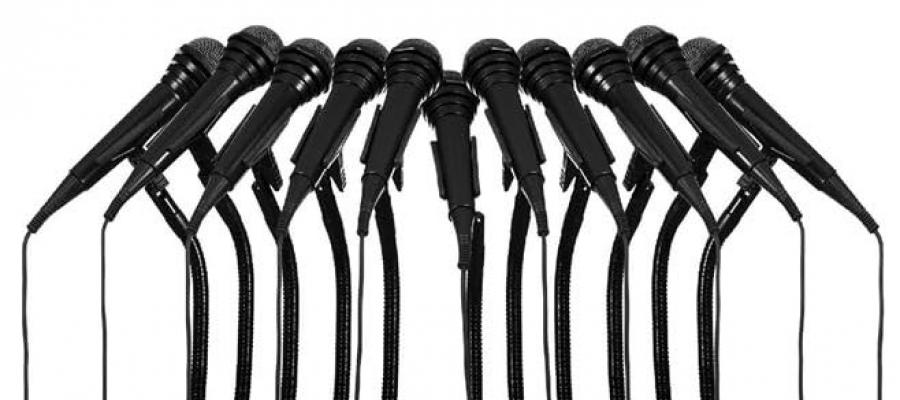Who Speaks For You?
Jul 21, 2024People often speak on behalf of others, like the concerned citizen who stands up for their neighbors at a city council meeting, or the activist who defends the rights of an oppressed group.

When we think of people who speak on behalf of us, we usually think of someone elected or appointed to do so: a congressperson, a senator, maybe even a department chair. But what about people who aren’t elected or officially appointed? What if, say, one of your neighbors goes to a city council meeting and complains about all the noise on your street? They’re speaking on behalf of the whole street, including you—would you be pleased or upset that they said something?
Of course that might depend on (among other things) whether you're the one who was throwing that loud party. But either way, shouldn’t they check in with you and the other residents before speaking on your behalf? What gives them the right to think they represent the whole block? Aren’t they just busybodies, arrogating power to themselves in an undemocratic way?
Maybe, but who else is going to stand up against you and your raging improv nights? That person is doing a public service by taking the initiative to speak up. They may not have been appointed to any official role, but once they were there, everyone (except you) felt good about it—that’s a form of democratic endorsement. But should the same logic apply to constituencies larger than a small city block? What if someone appoints themselves spokesperson for the city, the country, the world? Who gets to speak on behalf of women, minorities, the younger generation?
It seems obvious who should get to speak on behalf of, say, women: a woman. Women are best placed to know what life is like for them, since they’ve had to deal with the crap the world throws at them for being women, and they’ve had time and incentive to think about it. But can any woman represent the entire gender? Historically that hasn’t worked out so well: often you get a rich privileged person making sweeping claims about what it’s like for everyone, and they miss all sorts of things that aren’t part of their own experience.
One solution, of course, is to have more than one spokesperson—in this case, rich women, poor women, women of various races, various ages, various professions—so that everyone can be represented. But that may turn out to be a recipe for having, in effect, 4 billion spokeswomen. So it’s always going to have to be a balance. You’re not going to get perfect representation, but it’s really important to have somebody: if you're a member of a disadvantaged group, you need other group members to speak up on my behalf.
And yet if our spokespeople are going to be different from us in all kinds of ways, why could’t they be, say, of a different gender? After all, sometimes a woman isn’t around to speak up on behalf of other women—like in a locker room, for example, when men are saying horrible things. Does that that guy just need to sit down and shut up as soon as he gets outside the locker room? Sometimes it’s strategically advantageous to be represented by an outsider, like when Bono convinced the George W. Bush administration to put tons of money into AIDS funding for Africa. Given the unfortunate way the world is, they weren’t listening to people in the countries concerned—and Bono made a difference.
Of course we may not want to rely on loud-mouthed crooners with a white savior complex, and our guest, Wendy Salkin, whose new book is Speaking For Others, will surely have some proposals for how to best manage having people speak on our behalf.
Comments (4)
LinaJH
Wednesday, October 2, 2024 -- 7:36 AM
Usually, in place of suchUsually, in place of such people, we want to see people who are similar to us, or at least who have similar experiences. But it often happens when those who have no similar experience teach us how to do it. For example, writers of books about raising children who do not have them, as well as experience in raising children. This is interesting.
siripum
Thursday, April 17, 2025 -- 7:32 AM
We had the exact sameWe had the exact same challenge while launching our app. We didn’t want to slow users down, but we needed something more than just a basic email confirmation. We ended up going with Trustswiftly https://trustswiftly.com because it lets you pick and choose different verification steps — and you can trigger them based on risk, location, or behavior. It’s super easy to integrate, and their dashboard makes it easy to track who’s passing or failing verification. We used SMS and email for most users, and added ID verification only for flagged accounts. It strikes the right balance between friction and security. Our drop-off rates are low, and fake signups are almost nonexistent now.
alex403
Sunday, April 20, 2025 -- 6:35 AM
If you're looking to discoverIf you're looking to discover hidden culinary gems across the UK, Menu Explorer UK at https://menuexplorer.uk/ is your go-to guide. Dive into a world of delicious menus and local flavors curated just for food lovers!
rmsaybolt1
Tuesday, May 13, 2025 -- 11:19 AM
I was browsing for new hikingI was browsing for new hiking trails and got curious about online gaming. Thought I’d check out a site Aussies trust. Kudos Casino caught my eye with its clean layout. This Australian focused platform, licensed by Curacao, offers heaps of pokies and secure payments. Their welcome bonus gives spins and extra cash, and weekly promos like free spin drops add value. Frankly, the live dealer tables were a fun vibe.